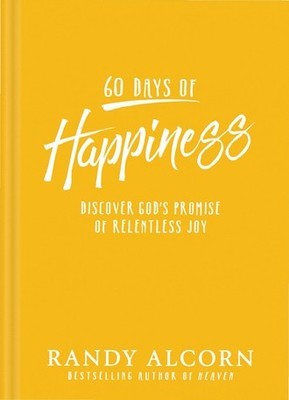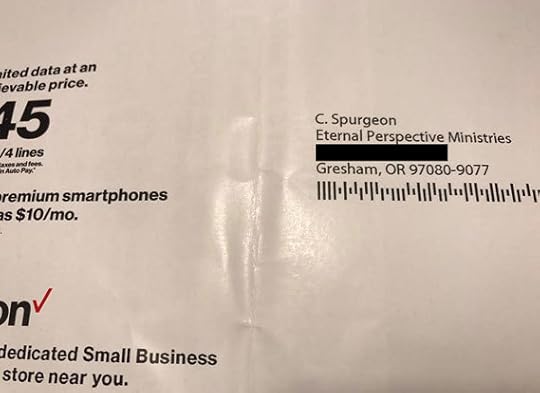Randy Alcorn's Blog, page 132
June 19, 2017
Happiness in Jesus Is a Righteous, God-Honoring Desire

This interview on happiness and the Christian life, and specifically related to my devotional 60 Days of Happiness, originally appeared on Lifeletter Café.
What is the most important thing you are hoping to accomplish in 60 Days of Happiness?
 My hope is that readers will experience some paradigm shifts that will forever change their view of happiness and what God thinks of it. It may also change their perspective on God’s nature, causing them to see Him in a way that floods them with gladness and increases their fondness toward our Creator. “In your presence there is fullness of joy; at your right hand are pleasures forevermore” (Psalm 16:11). Much of the battle for joy hinges on whether we believe God is happy and wants us to be too.
My hope is that readers will experience some paradigm shifts that will forever change their view of happiness and what God thinks of it. It may also change their perspective on God’s nature, causing them to see Him in a way that floods them with gladness and increases their fondness toward our Creator. “In your presence there is fullness of joy; at your right hand are pleasures forevermore” (Psalm 16:11). Much of the battle for joy hinges on whether we believe God is happy and wants us to be too.
As they contemplate God’s happiness, I believe readers of 60 Days of Happiness will end up not only loving Him more but liking Him better. At least, that’s what happened to me as I studied Scripture and meditated on this subject for more than three years.
Religion so often has brought with it a culture of heaviness and "reverence"—what do you say to those who have a hard time making room for happiness?
I think we have a hard time seeing the place of happiness in the Christian life because we fail to understand that God is happy and that He created us to find delight and satisfaction in Him. Philosopher and theologian Cornelius Van Til (1895–1987) stated, “We may say, in all reverence, that God himself is happy.”
Some readers may be thinking, But does the Bible really say God is happy? The answer is yes—it does! Many times Scripture states that God experiences delight and pleasure. Other times when it affirms God’s happiness, readers of English Bibles don’t understand what the original language was communicating.
The apostle Paul wrote of “the gospel of the glory of the blessed [makarios] God with which I have been entrusted” (1 Timothy 1:11). Later in the same book, he refers to God as “he who is the blessed [makarios] and only Sovereign, the King of kings and Lord of lords” (6:15). In 1611, when King James translators chose the word blessed in verses like these, it meant “happy”! In fact, the 1828 edition of Noah Webster’s dictionary still defined blessed as, “Made happy or prosperous; extolled; pronounced happy. . . . Happy . . . enjoying spiritual happiness and the favor of God; enjoying heavenly felicity.”
Only when we understand that Scripture teaches God is happy can we believe that God wants us to be happy and that happiness has a legitimate place in our worship and reverence for Christ. Scripture makes this statement about imitating Jesus: “Whoever says he abides in him ought to walk in the same way in which he walked” (1 John 2:6). If Jesus walked around mostly miserable, we should be miserable too. If He was happy, we should be happy.
How did happiness get dismissed by the "joy theologians" as something only on the surface or something tied to circumstances?
There’s a long rich, history of equating joy with happiness in Christ. For example, Jonathan Edwards cited John 15:11 (“that [Jesus’] joy might remain in you,” KJV) to prove this point: “The happiness Christ gives to his people, is a participation of his own happiness.”
Charles Spurgeon said, “May you so come, and then may your Christian life be fraught with happiness, and overflowing with joy.” Spurgeon’s views of happiness and joy, evident in hundreds of his sermons, are completely contrary to the artificial wall the contemporary church has erected between the two.
In stark contrast to believers prior to the twentieth century, many modern Christians have portrayed happiness as, at best, inferior to joy and, at worst, evil. Oswald Chambers (1874–1917), whom I greatly respect, is one of the earliest Bible teachers to have spoken against happiness. Chambers wrote, “Happiness is no standard for men and women because happiness depends on my being determinedly ignorant of God and His demands.”
After extensive research, I’m convinced that no biblical or historical basis exists to define happiness as inherently sinful. Unfortunately, because Bible teachers such as Chambers saw people trying to find happiness in sin, they concluded that pursuing happiness was sinful.
Because this concept of joy vs. happiness has been repeated and preached so often throughout the last century, many Christians believe there’s a huge difference between them. Now it’s common to hear people make claims like this: “Joy is in the Bible, but happiness isn’t.”
The problem with statements like these is that they simply aren’t true. Even in the King James Version, which Chambers used, happy is found a total of twenty-nine times. For example, Jesus told His disciples, “If ye know these things, happy are ye if ye do them” (John 13:17). The apostle Paul wrote these words to Christians: “Happy is he that condemneth not himself in that thing which he alloweth” (Romans 14:22).
When did you uncover happiness as a core ingredient in your faith in Christ?
When I first read the Bible as an unchurched teenager, it was new, intriguing, and utterly disorienting. Because I had no reference points when I read Scripture, it wasn’t just Leviticus that confused me. But when I reached the Gospels, something changed. I was fascinated by Jesus. Everything about Him had the ring of truth, and soon I came to believe He was real. Then, by a miracle of grace, He transformed me—and the single most noticeable difference was my newfound happiness.
In the over forty-five years since, like everyone else, I’ve experienced suffering and heartaches in my life. Still, every day I find happiness in the One who reached out to me with His grace decades ago—and continues to do so whenever I call out to Him.
Yet as a young Christian, because I often heard warnings against happiness, I became wary of it. These proclamations were common enough that it seemed they must be right. But they made me uneasy, because I had celebrated my newfound happiness in Christ. Now I was being told that happiness was at least suspect and apparently even unspiritual, and shouldn’t be part of a serious Christian life.
To me, this was counterintuitive. Of course, we shouldn’t turn to sin for happiness—but happiness was something I gained when I came to Christ, not something I gave up! If it was God who made me happy to be forgiven and gave me the joy of a right relationship with Him and the privilege of walking with Him and serving Him, was God really against my happiness?
Years later, I’ve found that many believers are still operating under that assumption that happiness is inherently sinful and has no part in the Christian life. That’s one of the main reasons I studied what God’s word has to say about our happiness and His, and wrote my comprehensive book Happiness, as well as the devotional 60 Days of Happiness and small book God’s Promise of Happiness.
I’m remembering this lyric from my childhood days in church: "Trust and obey, for there’s no other way, to be happy in Jesus, but to trust and obey." Is this supported by your thesis that happiness and holiness go hand in hand?
In the church I attended, an old Swedish Covenant congregation, we often sang that chorus, too. Though it has been many years since I sat in that church, the refrain still runs through my mind, and it’s worth repeating:
Trust and obey, for there’s no other way
To be happy in Jesus, but to trust and obey.
Some might consider that message simplistic, but I found it to be completely true. When I trusted Jesus, I was happy; when I didn’t, I wasn’t. When I obeyed Jesus—when I chose the path of holiness—I was happy. When I didn’t, I wasn’t.
I can confirm that those words are just as true now as they were then. In fact, they’ve proven true every day of my life since.
Note that the words aren’t an appeal to trust and obey because God demands our obedience (though He has every right to). Rather, the motive for trusting and obeying is being happy in Jesus.
When that hymn was written, happiness in Jesus was regarded as a righteous desire. That’s how we should regard it today. It’s not in opposition to our sanctification; it goes hand in hand with true, humble, Christ-honoring holiness.
How do you answer those who charge that "happiness" in the life of a Christ-follower is not the destination or end-goal?
I would agree that happiness, in and of itself, isn’t our ultimate goal.
At one point in my life, I wanted Jesus plus happiness. But this, I’m convinced, is wrong. What I first experienced as a young Christian was exactly right—happiness in Jesus. Jesus plus happiness separates the two, and when this occurs, happiness ascends the throne instead of Jesus. But happiness in Jesus recognizes that Jesus is bigger than happiness. This keeps happiness in its place. It doesn’t become an idol; instead, it’s seen for what it is—a natural and beautiful by-product of knowing and loving God.
If gambling, alcohol, television, video games, golf or fantasy football has become an idol to us—as nearly anything can—we’d be wise to give it up. But we can’t give up our desire for happiness. Instead, we need to turn it to its proper object—God—putting Him first by seeking our greatest happiness in Him.
Some might still say, “Our sole purpose in life is to glorify God, not to seek happiness.” But as John Piper puts it, “God is most glorified in us when we are most satisfied in Him.” In other words, to be happy in God is to glorify God.
The Westminster Shorter Catechism was written in 1646 by a group of English, Irish, and Scottish Reformed theologians. It begins with the question, “What is the chief end of man?” and offers the reply, “Man’s chief end is to glorify God and to enjoy Him forever.” For theologians to come up with “glorify God” is no surprise. But to enjoy him forever?
Think about this. Why didn’t they add “obey God forever” or “fear God forever”?
The composers of the catechism weren’t firing off an e-mail in which they chose words on the fly. They were writing a painstakingly deliberate statement of belief and practice that generations to come would memorize and seek to live by. Each word was judiciously selected.
Those seventeenth-century theologians and pastors stated that we exist not only to glorify God but also to find pleasure and happiness in Him. This doesn’t fit the stereotype of stodgy religious Scotsmen from nearly four hundred years ago.
Remarkably, the English Parliament officially endorsed this confession not long after it was written. What did theologians and even members of Parliament realize that has somehow been obscured in the centuries that followed?
And what does it mean to enjoy God? The Puritans knew. Thomas Watson said, “What is enjoying God for ever but to be put in a state of happiness? . . . God is the summum bonum, the chief good; therefore the enjoyment of him is the highest felicity.”
The catechism writers understood that God created people not only to glorify Him but also to be happy in Him—to be in a personal relationship with Him that’s deep, satisfying, and everlasting. As Psalm 68:3 says, “But may the righteous be glad and rejoice before God; may they be happy and joyful” (NIV).
What is one of your favorite stories or segments from 60 Days of Happiness?
In day 27, “Who or what is our primary source of happiness?” I share that one of the keys to enjoying life is connecting the dots between our happiness and God as its provider. He’s the one whose overflowing reservoir of happiness has spilled over into His creation.
As I wrote that entry for the book, I was looking up from my computer at a photo I took underwater. It reminded me of the sheer delight of my unforgettable ninety-minute encounter with a wonderful monk seal I named Molly.
Whenever I look at Molly’s photo, my heart fills with joyful memories and longing for the New Earth’s joy and the days that await us. That anticipation gives me a harvest of happiness today. Of course, many people who don’t know God love to snorkel and dive. They’re truly moved by the enchanting beauty of the reef.
But an immense part of my happiness as I snorkel is knowing God, the primary, who made all these secondary wonders. I sense His presence with me—both when I’m out in His ocean and as I sit in my home remembering His nearness, both then and now. This is a shared experience between my God and me, and even as I type, the memories of countless hours spent in the water together with Him, enjoying His beautiful underwater kingdom, bring joyful tears to my eyes. The beautiful coral reef and its wondrous creatures don’t draw me away from God—they draw me to Him.
Photo: Unsplash
June 16, 2017
Fathers, Your Relationship with Your Kids Is Irreplaceable

Before I get to today’s blog, thought I’d share this photo I posted on my Facebook page last weekend. So, Nanci and I get junk mail from Verizon and others, nothing new about that. And occasionally we get mail addressed to somebody else. But this came last Saturday, and it was a first:

Actually, Charles Spurgeon stopped working for our ministry years ago. And he never got used to his cell phone. Don’t know how to break it to Verizon!
On to today’s blog: this Sunday is Father’s Day. Fatherhood is a huge job, and dads need encouragement that their role in the kids’ lives matters. I recently watched this video highlighting the importance of dads, and absolutely love it.
As I tried to portray in my novel Courageous, fathers, you are irreplaceable in the lives of your children. So take some time this weekend to enjoy time with them, to talk with them about their fears, hopes, questions, and daily lives. You provide something for them that no electronic device can ever substitute!
Dennis and Barbara Rainey offer this advice:
A spiritually strong family is built on a foundation of "relational concrete." Tell your children your values, expectations, goals, and dreams for them, your family, and yourself. Ask them about their worries and their own dreams and goals. It's not words by themselves that communicate love—it's talking with your children in a way that shows deep interest and a strong desire to be involved in their lives.
…This loving conversation begins while your baby is still in the womb. It grows and matures throughout a child's development; when your child reaches adulthood you can communicate like friendly peers.
Talking may be a challenge during the teenage years, but it's more important at this time than ever. Many teenagers—boys especially—just do not seem to want to talk. But don't give up. You must pursue them—a persistent, gentle priming of the conversation well. Be prepared for that moment when the mood shifts and the words literally gush out of your teenager's mouth. Give your teen your full attention; listen well before you respond.
…Our model in being available and giving ourselves to our children is a good one. Jesus said, "Behold, I stand at the door and knock; if anyone hears My voice and opens the door, I will come in to him, and will dine with him, and he with Me" (Revelation 3:20). That picture of a loving God knocking and waiting, eager to enter a life, is how our children should perceive us.
Photo: Unsplash
June 14, 2017
Joni Eareckson Tada’s Advice for When You Don’t Wake Up Feeling Happy

As I’ve written and talked about happiness, I’ve heard from lots of people wondering how we can experience true, heartfelt, and Christ-honoring happiness in a broken world where life can be difficult. They often ask something like, “What should I do when I just don’t feel happy?”
It’s true that we can’t make ourselves happy in God any more than a seed can make itself grow. But we’re not just seeds. We’re greenhouse farmers who can make sure the seed is planted, watered, and fertilized.
Paul said to the church in Corinth, “I planted, Apollos watered, but God gave the growth” (1 Corinthians 3:6). While God makes the crop grow, the people who raise the largest and best produce, winning ribbons at the county fair, do their part too.
We should never flippantly say, “Happiness is a choice.” It’s not always easy to choose what brings ultimate lasting happiness over what brings instant temporary happiness. Choosing happiness is not merely working harder to pull up our minds and moods, as we would our bootstraps. Rather, it’s gratefully receiving God’s grace and happiness.
Still, there’s a lot to be said for “Just do it.” Harvard psychologist Jerome Bruner says, “You more likely act yourself into feeling than feel yourself into action.”
Too many of us wait for sufficient motivation before making wise and joy-producing choices. But whether it’s exercise, eating right, or volunteering to serve others, when we take those first steps, we overcome inertia and establish new habits. Once we see the positive happiness that results, we’re much more motivated to keep up those new patterns.
In an interview with World Magazine, one of my heroes of the faith, Joni Eareckson Tada, shares this advice for what we can do on days when we don’t wake up feeling happy:
Does depression still ensnare you at times? Are you happy? I make myself be happy. I make myself sing because I have to. The alternative is too frightening. My girlfriends will tell you, in the morning when I wake up, I know they’ll be coming into my bedroom to give me a bed bath, do my toileting routines, pull up my pants, put me in the wheelchair, feed me breakfast, and push me out the front door. I lie there thinking (gagging noise), “Oh God, I cannot face this. I’m so tired of this routine. My hip is killing me. I’m so weary. I don’t know how I’m going to make it to lunchtime. I have no energy for this day. God, I can’t do quadriplegia. But I can do all things through You as You strengthen me. So God, I have no smile for these girlfriends of mine who are going to come in here with a happy face. Can I please borrow Your smile? I need it, desperately. I need You.”
Our weakness, God’s strength. I hate the prospect of having to face the day with paralysis. I choose the Holy Spirit’s help because I don’t want to go down that grim, dark path to depression any more. That’s the biblical way to wake up in the morning, the only way to wake up in the morning. No wonder the Apostle Paul said, “Boast in your afflictions.” Don’t be ashamed of them. Don’t think you have to hide them and gussy yourself up before God in the morning so that He’ll be happy with you and see that you’re really believing in Him. No, no, no. Admit you can’t do this thing called life. Then cast yourself at the mercy of God and let Him show up through your weakness because that’s what He promises—2 Corinthians 12:9.
For more on happiness, see Randy’s books Happiness and God’s Promise of Happiness, and the devotional 60 Days of Happiness.
Photos: Unsplash
June 12, 2017
A Look Back at 10 Years of Blogging, and a Book Giveaway

Ten years ago today, EPM shared my first blog post, “There is a God,” which featured Bryant Young, then defensive tackle for the San Francisco 49ers. We’ve since shared over 1,300 posts on a wide range of topics, including Heaven, suffering, giving, prolife issues, happiness, current events, and much more.
Here are a few highlights from over the years:
How Can I Stay Motivated in My Relationship with Jesus Christ?
Six Eternal Truths to Remember Each Day
Depression, Gratitude and Charles Haddon Spurgeon
Why Doesn’t the Church Address the Issue of Modesty?
Thoughts on Cremation vs. Burial, and the Resurrection Question
Should Christians Save for Retirement?
Six Reasons to Live More Simply—and Give More Generously
How Do I Minister to an Unsaved Friend Whose Loved One Died Without a Relationship with Christ?
The One Thing My Daughter Remembered Most About My Parenting
Uncoolness, Tolerance, and Christ’s Bride the Church
Thanks for being part of our ministry by reading the blog and sharing posts with others! (By the way, if you’d like to receive them directly in your inbox, sign up in the sidebar of my blog with your email.)
In honor of the ten year anniversary, EPM is giving away two sets of Randy’s larger books, including Heaven, If God Is Good, Happiness, ProLife Answers to ProChoice Arguments, and Money, Possessions, and Eternity:
Photo: Pixabay
June 9, 2017
Christ’s Exclusive Truth-Claims Make Believing “All Religions Are Basically the Same” Impossible

A Barna survey found that 59% of American adults believe that “Christians and Muslims worship the same God even though they have different names and beliefs regarding God.” And it’s not just secular people who believe that “all religions are basically the same”:
One-quarter of born again Christians said that all people are eventually saved or accepted by God (25%) and that it doesn’t matter what religious faith you follow because they all teach the same lessons (26%). An even larger percentage of born again Christians (40%) indicated that they believe Christians and Muslims worship the same God.
A 2017 Barna Poll found that “almost three in 10 (28%) practicing Christians strongly agree that ‘all people pray to the same god or spirit, no matter what name they use for that spiritual being.’” (I’ve written more about the question “Do Christians and Muslims worship the same God?” in an earlier blog post.)
But truth-claims in all religions—including Christianity—are by nature exclusive. Jesus didn’t say, “I am a way and a truth and a life; I’m one way to come to the Father.” He said, “I am the way and the truth and the life. No one comes to the Father except through me” (John 14:6, emphasis added). If someone says Jesus isn’t the primary truth, then either he’s wrong or Jesus is.
How many routes can take us to the Father in Heaven? Peter preached, “Salvation is found in no one else [but Jesus], for there is no other name under heaven given to men by which we must be saved” (Acts 4:12).
Yet many continue to insist that Christ was merely a good teacher, and just one of many ways to God—perhaps because if the Bible is true and we’ll be held accountable to God, then we realize we’re in trouble. Many people don’t want to hear there’s a God who created us, says we are sinners, makes demands on our lives, and claims to be our Judge that we must answer to. (The flip side of that bad news about our sin and accountability is the very Good News that Jesus, God’s own Son, came to earth as a man, suffered and died in our place, rose again, and freely offers us forgiveness and eternal life!)
In his book Encounters with Jesus, Tim Keller writes:
Some years ago I was on a panel with a Muslim cleric, talking about our differences in front of a group of college students. And one college student kept insisting, “Well, I listened to you both for twenty minutes, and I want you to know that I just don’t see any real difference between you. I just don’t see any difference between the religions. It seems like you’re basically saying God is love and we should love God and love one another.” In our responses to the student the cleric and I were in complete agreement. At first glance it looks tolerant to say “you are both alike,” but each of us argued gently that the student was not showing enough respect to listen to each religion’s distinctive voice. Each faith had made unique claims that contradicted the deepest teachings of other faiths. And so, we concluded, while each faith could certainly appreciate wisdom in the other, we couldn’t both be right at the deepest level. The student maintained his position, saying that all religions are fundamentally alike.
Ironically, the young man was being every bit as dogmatic, superior, and ideological as any traditional religion adherent can be. He was saying, in essence, “I have the true view of religion, and you don’t. I can see that you are alike, but you can’t. I am spiritually enlightened, and you aren’t.” But as I spoke to him a bit afterward I concluded that he was motivated by an underlying fear. If he granted that any religion made unique claims, then he would have to decide whether or not those claims were true. He did not want the responsibility of having to ponder, weigh it all, and choose. Among young secular adults it is common to adopt this belief that all religions are roughly the same. Dare I say this is a form of emotional immaturity? Life is filled with hard choices, and it is childish to think you can avoid them. It may seem to get you out of a lot of hard work, but the idea of the equivalence of religions is simply a falsehood. Every religion, even those that appear more inclusive, makes its own unique claim. But Jesus’ claims are particularly unnerving, because if they are true, there is no alternative but to bow the knee to him.
Tim Keller, Encounters with Jesus: Unexpected Answers to Life's Biggest Questions, (New York: Penguin Books, 2013), 195–196.
Christianity rises or falls on the resurrection of Jesus Christ from the dead. If this event is historically true, it makes all other religions false, because Jesus Christ claimed to be the one and only way to God the Father. To prove this, He predicted He would come out of the grave alive three days after He was executed. And He did.
The resurrection of Christ is provable by overwhelming evidence (read Evidence That Demands a Verdict by Josh McDowell or The Case for Christ by Lee Strobel). What does the resurrection mean? It means Christ is God and since He said He is the only way to forgiveness of sins and the only way to Heaven—all other religions are false.
Jesus asked His disciples the most important question: “Who do you say I am?” (Matthew 16:16). If we get it right about Jesus, we can afford to get some minor things wrong. But if we get it wrong about Jesus, it won’t matter in the end what else we get right.
For more on the topic of truth, see Randy’s devotional Truth: A Bigger View of God’s Word.
Photos: Unsplash
June 7, 2017
Why Every Prolife Church in Oregon Should Support the Petition to Stop Taxpayer Funding for Abortion

The last 27 years I’ve been with Eternal Perspective Ministries. Before that I was a pastor for 14 years, and I have a number of close friends who are pastors. I feel like I understand their worlds.
I understand why pastors struggle with the many political issues people want them to address in church. In my opinion, most issues that are only political have no place in a local church, as it’s the place for solid Bible teaching and sound doctrine, not pitting social conservatives against liberals and thereby dividing the church. (See my article Conservative, Liberal, or Christian?) As a result, there’s been increasing push-back against having any petitions in churches because they appear to politicize the church.
Frankly, when it comes to marginal issues I sympathize with this—we don’t need to make our churches more political. But there’s no sense in which the killing of children is a marginal issue that Scripture is indifferent to! Long before it was ever a political issue, it was a moral issue, and one which God has a clear and emphatic position on. I encourage you to take a look at what God’s Word says about unborn children, and what the people of God throughout history have said about abortion.
I also understand almost no topic is as guaranteed to offend some church members as abortion. But we’re not dealing here with “one more social/political issue.” We’re dealing with a unique and focused evil in which Satan has deeply vested interests. There are demonic forces behind child-killing. Abortion is Satan’s attempt to kill God in effigy by destroying the little ones created in God’s image. We can’t afford to simply look away or sweep this issue under the rug.
The desire to avoid people’s disapproval is a common reason for church leaders to hold back in prolife efforts, including making petitions available to reduce the number of abortions. But for every reason or excuse we have, we must be ready to answer a question on the last day: “Was that reason more important than the lives of all those children I created in my image and the lives of the men and women involved in this life-altering decision?”
In one year alone, taxpayer funds paid for the deaths of almost 4,000 unborn children in Oregon. The Oregon Health Authority reported that $2.42 million in state money was spent on abortions in 2016, the highest amount in the past 14 years. During the fiscal year 2015-2016, money was paid to Planned Parenthood and other abortion providers for 3,769 abortions covered under the Oregon Health Plan.
That breaks my heart. It also raises the question: what are we, as individuals, and collectively as the church, doing to help pregnant women and save those unborn children? I firmly believe that hearts are changed, women helped, and lives saved through God’s people reaching out and ministering to those in need, one at a time. But many lives can also be saved through judicial reform and legislative action, and for that we should rejoice. The jobs of personal intervention, education, and political action will all continue for decades to come, requiring great perseverance.
I highly encourage prolife churches to get involved with circulating petitions in an effort to help stop taxpayer funding of abortion in Oregon. Yes, I’m well aware that many, both church leaders and members, insist that it isn’t the job of the church to get involved in prolife activities. But what is the job of the church?
I appeal to believers to come to grips with the fact that loving God cannot be separated from loving our neighbor (Matthew 22:34–40). To a man who wished to define “neighbor” in a way that excluded certain groups of needy people, Christ presented the Good Samaritan as a model for our behavior (Luke 10:25–37). He went out of his way to help the man lying in the ditch. In contrast, the religious hypocrites looked the other way because they had more “spiritual” things to do. (I recently spoke on this topic of “ProLife Issues: Distraction from the Great Commission, or Part of It?” You can watch the video here.)
Here’s more about the petition headed up by Oregon Life United:
Initiative Petition 1 — known as the Stop Taxpayer Funding for Abortion Act — would prohibit state funds from being used for abortions, except when medically necessary or if required by federal law.
This is a pro-life petition drive for an Oregon ballot initiative to prohibit our state tax dollars from funding abortions. In order to qualify for the next general election we’ll need to gather signatures from more than 117,000 registered voters.
Hundreds of volunteers and churches are needed for this petition drive to be successful. We’ll provide training and resources to make it easy for you to:
Gather signatures from your friends, family, and neighbors
Gather signatures at your church or schoolYou can order petition sheets (for free) and get more information at the petition drive website: www.StopTheFunding.org.
Let’s join together to “love our neighbor” by protecting the youngest human lives in our state. Pastors and church leaders, if you place these petitions in your church for people to sign, it would be a great opportunity to explain from the pulpit why you are doing so. You can say it’s not to bring politics into the church; rather it’s to obey God’s Word which says, “Speak up for those who cannot speak for themselves, for the rights of all who are destitute. Speak up and judge fairly; defend the rights of the poor and needy” (Proverbs 31:8-9).
(Some have genuine concerns whether circulating petitions in church is legal; the answer is yes. According to the IRS churches may engage in legislative activity, which includes sharing petitions, and retain their tax-exempt status as long as it’s not more than an “insubstantial” part of its overall activity in terms of time and money. This document provides more information.)
A fitting conclusion is a quotation that many, including myself, have attributed to Martin Luther. While Luther said some similar things, it appears the author of these actual words was a nineteenth century novelist named Elizabeth Rundle Charles who wrote about Luther and other reformers. But regardless of who said it, it’s true and has application to whether Bible-believing churches are willing to speak up in defense of unborn children, and whether God’s people are willing to unite to oppose the taxes they pay being used to support Planned Parenthood, and thereby to fund child-killing:
If I profess, with the loudest voice and the clearest exposition, every portion of the truth of God except precisely that little point which the world and the devil are at that moment attacking, I am not confessing Christ, however boldly I may be professing Christianity. Where the battle rages the loyalty of the soldier is proved; and to be steady on all the battle-field besides is mere flight and disgrace to him if he flinches at that one point.
For more, see Randy’s books Why ProLife? and ProLife Answers to ProChoice Arguments. Also see his articles Pastors, You Must Speak Up on Abortion; Let’s Reach Out with the Gospel to Women Victimized by Abortion; and The Evidence Doesn’t Lie: The Unborn are Children (which includes a special note to pastors and church leaders).
Photo: Pixabay
June 5, 2017
Meet the Logos Hope, a Floating Bookshop and an Incredible International Ministry

I’ve blogged before about the Logos Hope, a ship owned and operated by OM Ships International. The ship ministry, the brainchild of one of Operation Mobilization’s founders, George Verwer, began in 1970 as part of OM’s global Christian training and outreach movement. Since then their ships (this is the fourth) have visited 480 different ports in 151 countries and territories and welcomed over 46 million visitors onboard. Ponder those amazing statistics!

Logos Hope travels to ports around the world, acting as a floating bookshop with over 5,000 titles. (They report that, on average, one million visitors come on board each year.)

OM Ships also provides training for those who work onboard, as well as volunteer opportunities to serve by providing supply aid and community care in the places they dock. Their international crew represents dozens of nations. (Karen Coleman, part of our EPM staff, has a personal connection to the Logos Hope—her son Zac served onboard for two years and met his bride, Hannah, there.)
This video shows more about the ship.
Check out another video, this one from their recent stop in Aruba. It not only shows the particular features of the country and the locals, but also the ship’s crew ministering and helping people and getting out the gospel, books, and education about health issues. I love it.
Nanci and I are really excited to have the opportunity to visit the Logos Hope later this month when I’m speaking at an OM conference in Montego Bay, Jamaica. Then, after the conference, we will spend five nights on the ship, seeing firsthand this vital community and ministry. I’ll also be speaking to staff/crew one morning.

How great it will be to enter the world of the Logos Hope! I look forward to sharing more after our return.
June 2, 2017
God’s Works of Art Point to Him

If you go to an art gallery, you can watch people sit for hours staring at a single great work of art. They’ve seen it and pondered it before, perhaps many times, for dozens or even hundreds of hours. The human artist unleashed his or her creative instincts on a canvas, for months—if not years—of their lives. The devotees of the painting find it inexhaustible and are able to see or sense something new in the painting each time they ponder it.
If this seemingly inexhaustible beauty is true of the products of human hands, how much more true is it of God’s hands?
 If people can stare tirelessly at a represented field of flowers created by Monet, how might we stare more intently at an actual field of flowers created by God? If we might endlessly ponder an artist’s rendition of a person, such as the Mona Lisa, shouldn’t we ponder all the more, and benefit from pondering, the wonder in the face of real people we see daily? And in particular, the marvelous person and work of Christ? If the words of Shakespeare can be read and reread with fresh understanding, how much more should the words of God yield new treasures of insights?
If people can stare tirelessly at a represented field of flowers created by Monet, how might we stare more intently at an actual field of flowers created by God? If we might endlessly ponder an artist’s rendition of a person, such as the Mona Lisa, shouldn’t we ponder all the more, and benefit from pondering, the wonder in the face of real people we see daily? And in particular, the marvelous person and work of Christ? If the words of Shakespeare can be read and reread with fresh understanding, how much more should the words of God yield new treasures of insights?
The music lover must turn on the music and listen. The nature lover and art lover must go out to nature or to an art gallery to contemplate their favorite beauties and discover new ones. So the Christ-lover must go to God’s Word and to God’s world to celebrate old insights and cultivate new ones.
Nature is secondary, a work of God and therefore one step from God, the primary. The work of a human being is tertiary, two steps from God who created the person, who created the art. If the secondary and tertiary can be so wondrous, how much more wondrous is the God who is the source of all secondary beauty, and is Himself the cosmic center of all primary beauty?
 Consider this the next time you are tempted to skip going to the Bible and prayer and to contemplate God, in order to watch television or play a game or check email or social media: Why turn away from the headwaters of ultimate wonder and beauty to drink from the trickles of muddy water so far from the Source?
Consider this the next time you are tempted to skip going to the Bible and prayer and to contemplate God, in order to watch television or play a game or check email or social media: Why turn away from the headwaters of ultimate wonder and beauty to drink from the trickles of muddy water so far from the Source?
Sure, there’s a place for games and social media, and we may (I do) have a duty to check our email. But let’s put first things first. This will not only acknowledge the primacy of our great God and Savior, but also put all secondary things in their proper place.
Speaking of art, from time to time I go back to this creative conveyance of the Gospel from rapper Propaganda.

Photos: Unsplash; Propanda photo
May 31, 2017
Ellery’s Prayer, Childlike Faith, and Hobbies on the New Earth
 My long-time friend Barry Arnold, one of the pastors at Cornerstone Church, shared this video of his 4-year old granddaughter Ellery. After a conversation with her dad Brian, Barry’s son and also my friend, Ellery prays for a member of their church, April, who was a youth leader at Cornerstone and a professional photographer, and who recently went to be with Jesus.
My long-time friend Barry Arnold, one of the pastors at Cornerstone Church, shared this video of his 4-year old granddaughter Ellery. After a conversation with her dad Brian, Barry’s son and also my friend, Ellery prays for a member of their church, April, who was a youth leader at Cornerstone and a professional photographer, and who recently went to be with Jesus.
I was touched by Ellery’s prayer, and I think you will be too.
Thank you, Ellery, for encouraging us with your prayer! If we enjoy hearing our children and grandchildren pray, how much more does God love to hear the prayers of His children. When Jesus said, “Truly, I say to you, whoever does not receive the kingdom of God like a child shall not enter it” (Luke 18:17), He showed how much He values childlike faith and trust in Him.
I’m also reminded that our children’s instinctive grasp of Heaven—and what we should look forward to there—is sometimes better than ours. (Christoplatonism hasn’t gripped them yet.) When Ellery says that April is still taking pictures, one of her favorite activities, in Heaven, I think she’s on to something, even if it might be delayed to the resurrection and life on the New Earth. Because most of our hobbies aren’t inherently sinful (if any are, we should give them up now), we have every reason to believe that the same activities, games, skills, and interests we enjoy here will be available on the New Earth, with many new ones we haven’t thought of.
In my book Heaven for Kids, I say this about the question of arts and entertainment in Heaven:
Do you like a good movie or play? Maybe you enjoy painting or drawing. Believe it or not, God invented art. He created the universe, then wrote, directed, and took the leading role in history’s greatest story. (It’s called the Drama of Redemption.) He is the one who gives artists and writers the kinds of minds and emotions and physical senses that give them their ideas.
Will we find ways to use the arts—including drama, painting, sculpture and music—to praise God? Will these arts continue to provide enjoyment and entertainment for people? I believe the answer is yes.
Think of the joy you feel when you make a card for your mom or grandpa, or when you draw a cartoon just to make your brother Zachary smile.
Or consider how you might feel if you and your cousins Ainsley and Hudson wrote and performed a skit at a family reunion. Then think about how awesome it would be to create something even better on the New Earth. Maybe a great play written by Savannah, starring her sisters Ellie and Julia and her cousins Bailey, Sawyer, and Sydney.
If we believe New Earth (Heaven) will be greater than our present Earth, then surely the greatest books, dramas, and poems are yet to be written. Authors will have new ideas and better ways of thinking. Awesome books, including exciting adventure stories, are just waiting to be written by Courtney and Camber. (And people will be eager to read them.) Mckinzie might paint beautiful landscapes. Christian might make sculptures, and Elena might fashion beautiful jewelry. Alexis and Spencer might compose and perform great songs, and maybe Logan will be the featured drummer.
I look forward to reading and perhaps writing books that describe how wonderful God is, helping me worship him better. And I’m eager to read about adventures you and others will be enjoying throughout the New Universe. I’d also like to see your plays and paintings of those adventures.
May 29, 2017
Kevin DeYoung on What We Can Learn from Church History About False Teachers

Paul warned the elders of the church in Ephesus, “I know that after my departure fierce wolves will come in among you…and from among your own selves will arise men speaking twisted things, to draw away the disciples after them” (Acts 20:29-30).
These “twisted things” often were not outright denials of the Bible. Rather, they were Scripture reinterpreted to fit the widely accepted beliefs of the culture.
More theological battles have been lost to enemies inside the church than to those outside. The evil one has targeted us for deception. Nothing less than the welfare of God’s people is at stake.
Paul also wrote, “If anyone teaches otherwise and does not agree to the sound instruction of our Lord Jesus Christ and to godly teaching, they are conceited and understand nothing” (1 Timothy 6:3-4).
Why is false doctrine connected with conceit? A proud person elevates self over God, believing he is smarter than God’s Word and can improve on it.
In reality, we can’t change what is and isn’t true, but the truth can and should change us. As Christ the living Word is truth, so His written word is truth. Though heaven and earth will pass away, God’s truth never will. Jesus prayed, “Sanctify them by the truth; your word is truth” (John 17:17).
In a recent post, I shared Joe Carter’s article on Broken Wolves. Today’s guest post is a follow-up to Joe’s article from Kevin DeYoung, one of my favorite bloggers. He offers some important points to consider about false teachers:
What Can Church History Teach Us About Wolves?
By Kevin DeYoung
Last week Joe Carter (not that Joe Carter) published an insightful article on the allure of broken wolves. It got me thinking about false teachers in the history of the church.
And by “false teacher” or “wolf” I don’t mean everyone who disagrees with me on a point of theology. As a Presbyterian, I think Baptists and Methodists and Pentecostals are wrong about some important things, but deviating from Westminster Confession of Faith does not make you another Arius or Pelagius. A false teacher or a wolf is someone who snatches up sheep (John 10:12), draws disciples away from the gospel (Acts 20:28), opposes the truth (2 Tim. 3:8), and leads people to make shipwreck of the faith and embrace ungodliness (1 Tim. 1:19-20; 2 Tim. 2:16-17).
Several years ago I did a series on heresies and heretics. Preparing the messages helped me understand church history better and more carefully articulate the orthodox faith. It also helped me notice some patterns (and non-patterns) related to false teachers. I discovered that church history can teach us a lot about wolves.
1. Wolves don’t usually know they’re wolves.
While some false teachers are knowing hypocrites who borrow religious language to fleece the flock, most errors in church history have been promoted by those who sincerely thought they were doing the work of God. As far as we can tell, Pelagius was not a big jerk. The Donatists were entirely earnest about the faith. We shouldn’t think that wolvish teachers and bloggers are trying to lead the sheep astray. People can be entirely sincere and still genuinely mistaken.
2. Wolves can quote the Bible.
It’s hard to know for sure what ancient heretics were like because most of what we know about them comes from the orthodox opponents writing against them. And yet, judging by the controversies left behind, we can assume that Arius knew his Bible. The Trinitarian and Christological debates of the early church, not to mention the soteriological controversies of the Reformation, involved people on both sides quoting Scripture. That doesn’t mean every viewpoint was right. It means that theology can come with Bible verses and still be wrong.
3. Wolves tend to be imbalanced.
Imbalanced may not be the right word. I’m not suggesting truth is always the golden mean between obvious extremes. What I mean is that false teachers have a tendency to let the big themes of Scripture silence specific verses. Wolves ignore the whole counsel of God. They like to take themes like love or justice or hospitality or law or grace and then round off all the edges of Scripture to fit this one big idea. The problem is not in trumpeting glorious truths. The problem is that their understanding of the truth gets truncated, and the application of the truth gets one-dimensional. This often leads to unbiblical conclusions that can sound biblical. Such as: If God is love, then we can’t have hell or moral demands that make me (or my friends) feel uncomfortable or unfulfilled. If Jesus ate with sinners, then we should not be overly concerned about sin. If God is sovereign over all things, then we shouldn’t evangelize. General truths pressed through to unbiblical conclusions.
4. Wolves are impatient with demands for verbal clarity.
False teaching thrives on ambiguity. It eschews careful attention to words and definitions. The Arians were willing to live with doctrinal imprecision. It was Athanasius and the orthodox party that insisted on defining terms. And they insisted on saying not just what was right but what was wrong. Good shepherds are willing to define and delimit. Don’t trust teachers who love to emote more than they love to be clear.
5. Wolves come in different shapes and sizes.
There is no one-size-fits-all approach to settling theological disputes. We will not be discerning if we imagine that false teachers are always Pharisees or always libertines. Or if we assume they are always too rigid or always too loose. Sometimes the truth is either/or: there is only one God, salvation is by faith alone, there is no other name under heaven. But sometimes the truth is both/and: one God in three persons, fully God and fully man, divine sovereignty and human responsibility. Sometimes error comes because we pay insufficient attention to an important issue. At other times, the problem is wasting time on “foolish controversies.”
We can’t solve all our problems the same way. We can’t always assume the more conservative answer is the best, or that the liberal answer is always true. If we are flexible in some places, it doesn’t mean we should be flexible in every place. If we are rigid over there, it doesn’t mean we need to be just as rigid with this issue over here. Wolves and false teachers don’t know how to use wisdom to settle different disputes in different ways.
For more on the topic of truth, see Randy Alcorn’s devotional Truth: A Bigger View of God’s Word.
Photo: Pixabay



